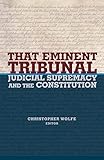That Eminent Tribunal : Judicial Supremacy and the Constitution / ed. by Christopher Wolfe.
Material type: TextSeries: New Forum Books ; 52Publisher: Princeton, NJ : Princeton University Press, [2009]Copyright date: ©2005Edition: Course BookDescription: 1 online resource (256 p.)Content type:
TextSeries: New Forum Books ; 52Publisher: Princeton, NJ : Princeton University Press, [2009]Copyright date: ©2005Edition: Course BookDescription: 1 online resource (256 p.)Content type: - 9780691116686
- 9781400826285
- 347.73/12
- KF5130.T48 2004
- online - DeGruyter
- Issued also in print.
| Item type | Current library | Call number | URL | Status | Notes | Barcode | |
|---|---|---|---|---|---|---|---|
 eBook
eBook
|
Biblioteca "Angelicum" Pont. Univ. S.Tommaso d'Aquino Nuvola online | online - DeGruyter (Browse shelf(Opens below)) | Online access | Not for loan (Accesso limitato) | Accesso per gli utenti autorizzati / Access for authorized users | (dgr)9781400826285 |
Frontmatter -- Contents -- Contributors -- Introduction -- Chapter 1. Is the Constitution Whatever the Winners Say It Is? -- Chapter 2. Nationhood and Judicial Supremacy -- Chapter 3. "Casey at the Bat"-Taking Another Swing at Planned Parenthood v. Casey -- Chapter 4. Antijural Jurisprudence: The Vices of the Judges Enter a New Stage -- Chapter 5. Judicial Power and the Withering of Civil Society -- Chapter 6. The Academy, the Courts, and the Culture of Rationalism -- Chapter 7. Judicial Moral Expertise and Real-World Constraints on Judicial Moral Reasoning -- Chapter 8. Toward a More Balanced History of the Supreme Court -- Chapter 9. Judicial Review and Republican Government -- Chapter 10. The Casey Five versus the Federalism Five: Supreme Legislator or Prudent Umpire? -- Chapter 11. The Rehnquist Court and "Conservative Judicial Activism" -- Index
restricted access online access with authorization star
http://purl.org/coar/access_right/c_16ec
The role of the United States Supreme Court has been deeply controversial throughout American history. Should the Court undertake the task of guarding a wide variety of controversial and often unenumerated rights? Or should it confine itself to enforcing specific constitutional provisions, leaving other issues (even those of rights) to the democratic process? That Eminent Tribunal brings together a distinguished group of legal scholars and political scientists who argue that the Court's power has exceeded its appropriate bounds, and that sound republican principles require greater limits on that power. They reach this conclusion by an interesting variety of paths, and despite varied political convictions. Some of the essays debate the explicit claims to constitutional authority laid out by the Supreme Court itself in Planned Parenthood v. Casey and similar cases, and others focus on the defenses of judicial authority found commonly in legal scholarship (e.g., the allegedly superior moral reasoning of judges, or judges' supposed track record of superior political decision making). The authors find these arguments wanting and contend that the principles of republicanism and the contemporary form of judicial review exercised by the Supreme Court are fundamentally incompatible. The contributors include Hadley Arkes, Gerard V. Bradley, George Liebmann, Michael McConnell, Robert F. Nagel, Jack Wade Nowlin, Steven D. Smith, Jeremy Waldron, Keith E. Whittington, Christopher Wolfe, and Michael P. Zuckert.
Issued also in print.
Mode of access: Internet via World Wide Web.
In English.
Description based on online resource; title from PDF title page (publisher's Web site, viewed 30. Aug 2021)


